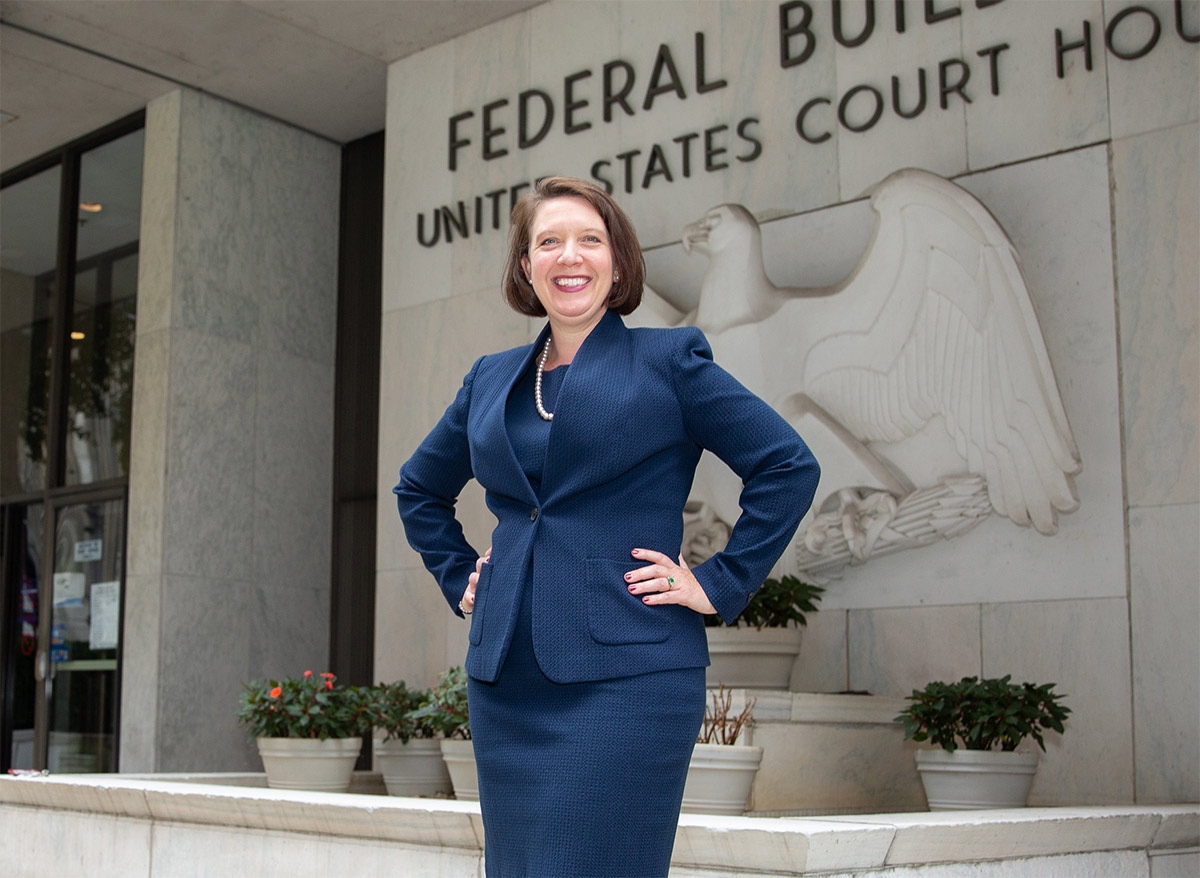

in June 2019, Jennifer Philpott Wilson ’01 was at the most intense job interview of her life. For the previous six months, she had studied the law harder than at any time since her days in law school, and taken time off from her law practice to travel and meet with selection committees, senators, and the president’s executive team. All of that preparation had led to this moment in the U.S. Capitol, before the Senate Judiciary Committee, with her friends and family in the audience, to be considered for a judicial seat on the United States District Court for the Middle District of Pennsylvania.
Wilson had watched numerous confirmation hearings available on the Senate Judiciary Committee website, using the questions asked to inform her study. She pored over the constitutional law casebooks that she and her husband, David Wilson ’01, had kept, and even reached out to Professor Maryellen Fullerton, her old Federal Courts professor, who sent her the current edition of a federal courts treatise.
But just before she was to be called, the committee chair, Senator Lindsey Graham, called a recess. Later that afternoon, Graham was the only senator to return from the recess, and would be the sole member of the committee for the remainder of the hearing. When her time on the agenda finally arrived, he asked Wilson, “Well, why don’t you tell me why you’d be a good district court judge?”
She replied, as she had in different variations for months, “I know I have the right qualifications, and I believe I also have the right personal qualities.”
Her qualifications were without question: degrees with honors from both Swarthmore College and Brooklyn Law School; clerkships for judges in federal district court and court of appeals; and a law career in civil and criminal litigation, state and federal courts, and government and personal representation. She had even developed a course at Penn State Dickinson Law to teach students how to be effective law clerks.
But between the lines of her impressive resume were all of the events that had informed her character and reinforced her lifelong passion for the law. The child of a lawyer, she had wanted nothing more than to join the “endless legal conversations” at the dinner table. She had immersed herself in the law, walking across the Brooklyn Bridge every day between her day job at the Manhattan D.A.’s office and her night classes at the Law School.
From her clerkships, she had learned of the specific challenges facing district court judges, who need to balance an overwhelming caseload with a commitment to seeing that every citizen’s “day in court” is given the attention and fairness it deserves.
Perhaps most important were the lessons she learned from her mentor, the late Professor Robert Pitler. “He was a perfectionist, arguably to a fault,” said Wilson. “He had difficulty ever feeling that any writing was finished, but he told me, ‘Anything you find worth doing is worth doing well.’ Now, his definition of ‘doing something well’ might drive most people crazy… but I was inspired by that. It’s what pushes me forward.”
In the weeks to come, the senators would send her written questions to respond to, followed by a long wait for her nomination to be placed on the Senate’s schedule. Finally, five months later and on a day’s notice, she watched live on C-SPAN as the Senate confirmed her nomination by an almost unanimous vote.
Although her first year on the bench has been marked by the disruption of the pandemic, it still has been a year of exciting challenges and great responsibility. Now, back in the courtroom, physically distanced and wearing a mask, she is mindful of the things that led to her success.
“I feel very grateful to Brooklyn Law School,” she said. “When you start out as a professional, much like when you leave home to go to college, the environment you’re leaving can be enormously helpful. As a young lawyer, I felt I had ‘left the nest,’ so to speak, but one that had been really supportive and helpful.”